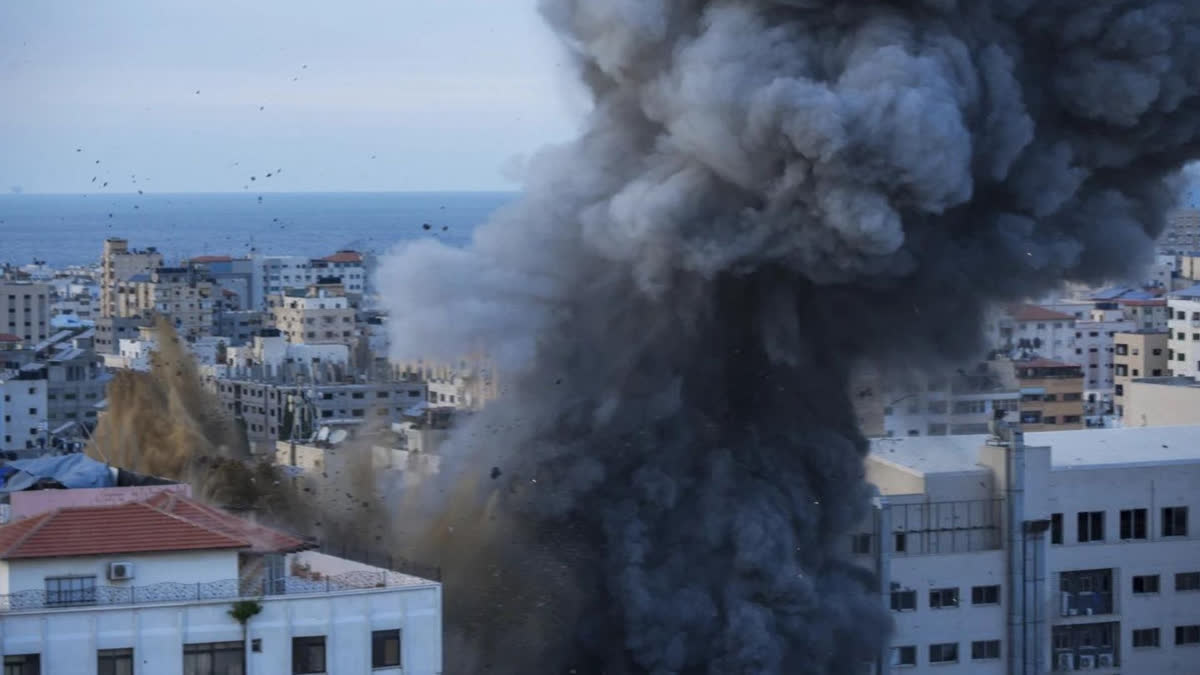New Delhi: Despite some positive developments in recent times in West Asia’s geopolitical scenario like the Abraham Accords and the diplomatic patch-up between Iran and Saudi Arabia brokered by China, the Hamas attack on Israel on October 7 came as a surprise. Or so the world tends to believe. But, the fact of the matter is that this was something waiting to happen. The initiatives taken in recent times to bring about reconciliation between Israel and other Gulf Arab countries did not address the core issue of the conflict in West Asia i.e., Palestine.
Take the Abraham Accords for example. The accords, mediated by the US, are bilateral agreements that seek to bring about normalisation of ties between Israel and Arab nations. The signatory countries agreed to establish official diplomatic relations, including the exchange of ambassadors and the opening of embassies. The Accords aimed to promote economic ties and collaboration in various sectors, such as trade, technology, healthcare, and tourism. The parties also committed to enhancing security cooperation, particularly in the areas of counterterrorism and regional stability. The accords encouraged cultural and people-to-people exchanges such as sports, education and tourism.
The United Arab Emirates (UAE), Bahrain, Morocco and Sudan signed the Abraham Accords with Israel. Saudi Arabia was next on the line, which observers believed would have been the mother of all accords. Apart from this, another positive development in the region was the resumption of diplomatic ties between Iran and Saudi Arabia. Ties between Iran and Saudi Arabia, which have always been strained, culminated in the cut-off of diplomatic relations in 2016. This was a result of 47 people being put to death in several Saudi cities, including prominent Shia cleric Nimr al-Nimr, and Iranian protesters setting ablaze the Saudi Embassy in Tehran in retaliation.
However, the two countries announced the resumption of relations in March this year, following a deal brokered by China. The deal followed several days of secret talks in Beijing by Iranian and Saudi officials. A joint statement announced that both sides would reopen their embassies in each other’s country. However, whether it be the Abraham Accords or the resumption of Iran-Saudi Arabia diplomatic ties, what did not figure at all is the Palestine issue that has been burning for decades. In recent times, things have become worse. With a far-right coalition government led by Prime Minister Benjamin Netanyahu in power in Israel, Israeli settlers in the West Bank have become emboldened and increased their attacks and provocations against Palestinian civilians.
“These Israeli settlers have become very bold and are nibbling away Palestinian territory,” R Dayakar, former Indian Ambassador to Iraq and Jordan, who also served in the West Asia desk of the Ministry of External Affairs, told ETV Bharat. “The Israeli government has done nothing to stop them.” According to the UN’s Office for the Coordination of Humanitarian Affairs (OCHA), settler violence has been increasing across the West Bank over the past years. Three settler-related incidents per day occurred on average in the first eight months of 2023 compared to an average of two per day in 2022 and one per day the year before. This is the highest daily average of settler-related incidents affecting Palestinians since the UN started recording this data in 2006.
“A total of 1,105 people from 28 Communities – about 12 per cent of their population - have been displaced from their places of residence since 2022, citing settler violence and the prevention of access to grazing land by settlers as the primary reason,” the OCHA said in a report in September this year. “Those displaced have moved to towns or other rural areas that they consider safer. Most of those displaced were in the governorates of Ramallah, Nablus and Hebron, which also have the highest number of Israeli settlement outposts. Four communities have been completely displaced and are now empty, including two that were vacated during the assessment. In six other communities, over 50 per cent of the residents left since 2022 and in seven additional communities, more than 25 per cent of the community has left.”
Apart from the settler violence, another issue that has been riling the Palestinians is the desecration of the Al Aqsa mosque in Jerusalem by the far-right Israeli elements. In September, Israeli forces imposed tight security measures ejecting worshippers from Al Aqsa Mosque and intensifying their presence around it, denying access to any Palestinian below the age of 50 to clear the way for Israeli settlers on Rosh Hashanah, the Jewish New Year. In recent times, Israeli religious nationalists such as National Security Minister Itamar Ben-Gvir have increased their visits to the Al Aqsa compound.
The Palestinian Authority, which is in power in the West Bank and is internationally recognised as the representative of the Palestinian people, has been able to do little about the settlers issue and the Al Aqsa problem. The Palestinian Authority is for a two-state solution that proposes the two states of Israel and Palestine exist side by side peacefully.
On the other hand, Hamas wants total annihilation of Israel and restoration of the original Palestine nation. Though the militant group is the de facto ruler of only the Palestinian territory of Gaza, it has appeal among sections of the Palestinian people in the West Bank too because of its assertiveness against Israel.
“Hamas wants to tell Israel that it cannot get away with the West Bank settlements,” Dayakar said. “It has been preparing for the attack for several months now. Hamas militants have been training themselves, equipping themselves. The attack was something waiting to happen. They just timed it to coincide with the 50th anniversary of the Yom Kippur War.”



